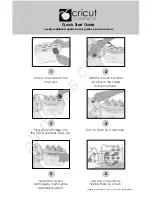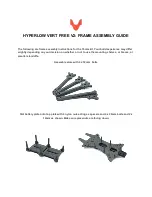
AUTOMATIC ICEMAKER & DISPENSER
(on some models)
5
Operating Y
our Refrigerator
Automatic Icemaker &
Dispenser
How They Work
The automatic icemaker makes ice continually. The dispenser
dispenses water, ice cubes or crushed ice through the freezer
compartment door. Here’s how they work.
Water flows from the household supply through a
(1) dual solenoid valve
to the
(2) water tubing and
to the
(3) automatic icemaker
as needed.
Water is frozen in the
(4) cube mold and
ejected into the
(5) storage bin where
a motor-powered
auger moves
cubes forward.
Cubes fall through the chute in the door when the dispenser
pad is pressed.
When CRUSHED is selected (on some models), a baffle channels
cubes through the crusher and crushed ice falls through a chute into
the glass.
When WATER is selected, (on some models) water flows through the
(6) tubing in the door and is dispensed when the dispenser
pad is pressed.
(7) A light switch (on some models) turns the night light in the
dispenser on or off.
The light also comes on when the dispenser pad is pressed.
The light in the dispenser should be replaced with a 7 watt maximum
bulb when it burns out.
3
7
6
4
5
1
2
Important Facts about Your Ice & Water Dispenser
• If this is your first icemaker you’ll hear occasional sounds that
may be unfamiliar. These are normal icemaking sounds and are not
cause for concern.
• Your icemaker will produce 8 cubes per cycle—approximately
120 cubes in a 24-hour period—depending on freezer compartment
temperature, room temperature, number of door openings and other
use conditions.
• Intermittent dispensing of ice is normal. If ice flow interruption is
more than brief, ice clump(s) may be the cause and should be
removed following instructions in this section.
• Avoid overfilling glasses with ice and using narrow or extra-tall
glasses. This can jam the chute or cause the door in the chute to
freeze shut. Periodically open the freezer compartment door and look
down into the chute. If ice is blocking the chute, poke it through with
a wooden spoon.
• To help keep bits of ice from being sprayed beyond the glass,
place the glass close to the ice chute—but not so close that it blocks
outcoming ice.
• Fill glasses with ice before adding soda or other beverage mixes.
• Beverages and foods should not be quick-chilled in the ice
storage bin. Cans, bottles or food packages in the storage bin may
cause the icemaker or auger to jam.
• Do not add ice from trays or bags to the storage bin. It may not
crush or dispense well.
Before Using Your Icemaker and Dispenser
If you use your refrigerator before the water
connection is made, raise the ice access door and
make sure the icemaker feeler arm is in the
STOP (up) position. When the water supply has
been connected to the icemaker, move the feeler
arm to ON (down) position.
At first there will be a delay before water is dispensed and ice is made.
On models with a water dispenser, if no
water is dispensed when the refrigerator is
first installed, there may be air in the water line
system. Press the dispenser pad for at least two
minutes to remove trapped air from the water
line and to fill the water system.
The ice cube mold will automatically fill with water AFTER cooling
to freezer temperatures. The first cubes normally freeze after
several hours.
NOTE: With a newly-installed refrigerator, allow about 24 hours
for the freezer compartment to get cold enough to make ice.
(continued next page)
WATER CRUSHED CUBEDICE
LIGHT
OFF ON
Feeler arm in
STOP (up)
position
Feeler arm in
ON (down)
position
Push the dispenser pad
until the water line is filled.






































